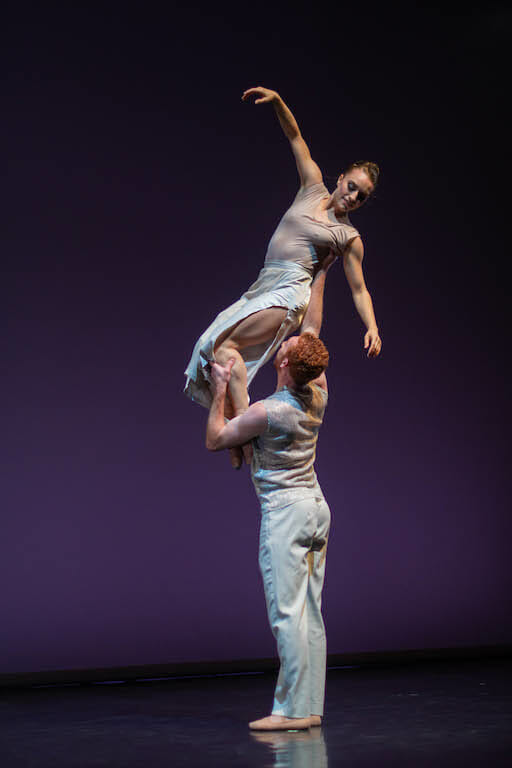The highlight of Terminus Modern Ballet Theatre’s performance Saturday night at Kennesaw State University’s Stillwell Theater was not the main event – Tara Lee’s Everything is Waiting — but the unannounced opener.
Retrograde Waltz, a premiere also by Lee, was a playful, romantic pas de deux for husband and wife duo Heath Gill and Jackie Nash, set to an original score by Andy D. Kurtz. It was short. It was joyful. And it was gorgeous.
It began with Nash walking serenely across the back of the stage, entering left, exiting right. Gill then entered from the right, walked across the stage and exited left. They repeated this pattern, but with variations. Their walking was interspersed with increasingly developed movement phrases – a change in pace, an extended leg, a deep lunge, an arched back. Each of them was self-contained, independent. Finally they met and the chemistry began.

As each extended a hand, her palm hovered over his, not quite touching. They flowed into supported pirouettes, lifts and delicate partnering on and from the floor. More than once, Gill gently grasped Nash’s waist from behind and drew her to him. Yet there were moments of separation, as if each needed some time alone, important in any good relationship.
Retrograde Waltz doesn’t break new ground, but it is an elegant demonstration of Lee’s talent as a choreographer and the Terminus style — fluid and expansive torsos and arms that give rise to emotion in motion, grounded in finely executed ballet technique. The work ended with Gill holding Nash above his head in a soaring, diagonal lift.
Everything is Waiting premiered in Atlanta’s 2019 Off the EDGE festival. In the intervening Covid years, Lee has had time to expand and tweak it. In sharp contrast to Retrograde Waltz, the work expresses the frustrations of everyday life through exaggerated physical humor.
It opened with company members rushing from one side of the stage to the other. They appeared hurried and stressed, each on his or her own trajectory, limbs flung out or piercing the air. Car horns could be heard as composer Jun Miyake’s familiar “Lilies of the Valley” took over the soundscape.
As the work progressed, the dancers fidgeted impatiently in line, got drunk during a happy hour that involved lots of wild antics but little lasting happiness, had petty disagreements in an elevator, and were haunted by the empty promises of television ads during one sleepless night. In each segment, large signs appeared — some carried by the dancers — to make sure we understood the context and could laugh and/or groan at the insanity of it all. “Line starts here.” “Can’t sleep? Take this pill.” “Side effects.” “FindLove.com.”
In the “FindLove.com” section, set to a contemporary rendering of Bach’s familiar Concerto No.5, couples came together, danced and then broke away, registering disgust as they discovered their date was not what they hoped she or he would be. To portray the superficial, unfulfilling or ridiculous aspects of everyday life, the dancers used gesture and larger-than-life facial expressions. Gill is a natural character actor, but not all the dancers appeared comfortable with these acting demands, often overplaying the moment.
This all changed when the choreography shifted to pure dance. It was a joy to see artistic director John Welker dancing again, and all five dancers demonstrated clean technique and a total commitment to Lee’s movement ideas. In one busy section, Christian Clark moved to the front of the stage and executed a perfect double tour en l’air, a tornado of compressed energy.

It was also delightful to see several different partnerships. Rachel Van Buskirk and Clark are frequent partners and exquisite together, but mixing and matching partners, however briefly, made the viewer sharply aware of how much each different pairing creates a unique visual and emotional charge.
The pure dance sections confirmed what we already know about this company – they are so finely tuned to one another that they seem to move as one body even when not performing in unison. Like a close family, they have an innate sense of one another’s strengths, weaknesses and personality on stage. A couple of muddy transitions did not detract from their fluent delivery of contemporary technique imbued with lightness. They were aided by Ben Rawson’s lighting and Tamara Cobus’ costume designs.
There were some standout moments. When Clark, as a lonely drunk, fell asleep at the end of happy hour, Laura Morton La Russa appeared as a dream woman and demonstrated her always solid and grounded presence. It was a sweet interlude.
Gill, Welker and Clark came together in an innovative trio. Van Buskirk demonstrated her ability throughout to seamlessly color movement with emotion. Nash made an uncredited appearance as a frenzied waitress.
As the work came to a close, we heard a reprise of “Lilies of the Valley,” but this time the dancers were facing front, dancing together and introducing loose, jazzy hips and shoulders, as if released from the muscular stiffness of tense and anxious bodies.
If Everything is Waiting and her powerful 2021 dance film The Poet are any indication, Lee’s choreographic vision is to deliver a message: the need for peace, harmony and transcendence in an often-challenging world. Everything is Waiting is sometimes too broad and obvious in its message and physical humor, but it gives the company ample time and space to demonstrate their successful embrace of a contemporary style all their own.
::
Gillian Anne Renault has been an ArtsATL contributor since 2012 and was named Senior Editor for Art+Design and Dance in 2021. She has covered dance for the Los Angeles Daily News, Herald Examiner and Ballet News, and on radio stations such as KCRW, the NPR affiliate in Santa Monica, California. Many years ago, she was awarded an NEA Fellowship to attend American Dance Festival’s Dance Criticism program.

